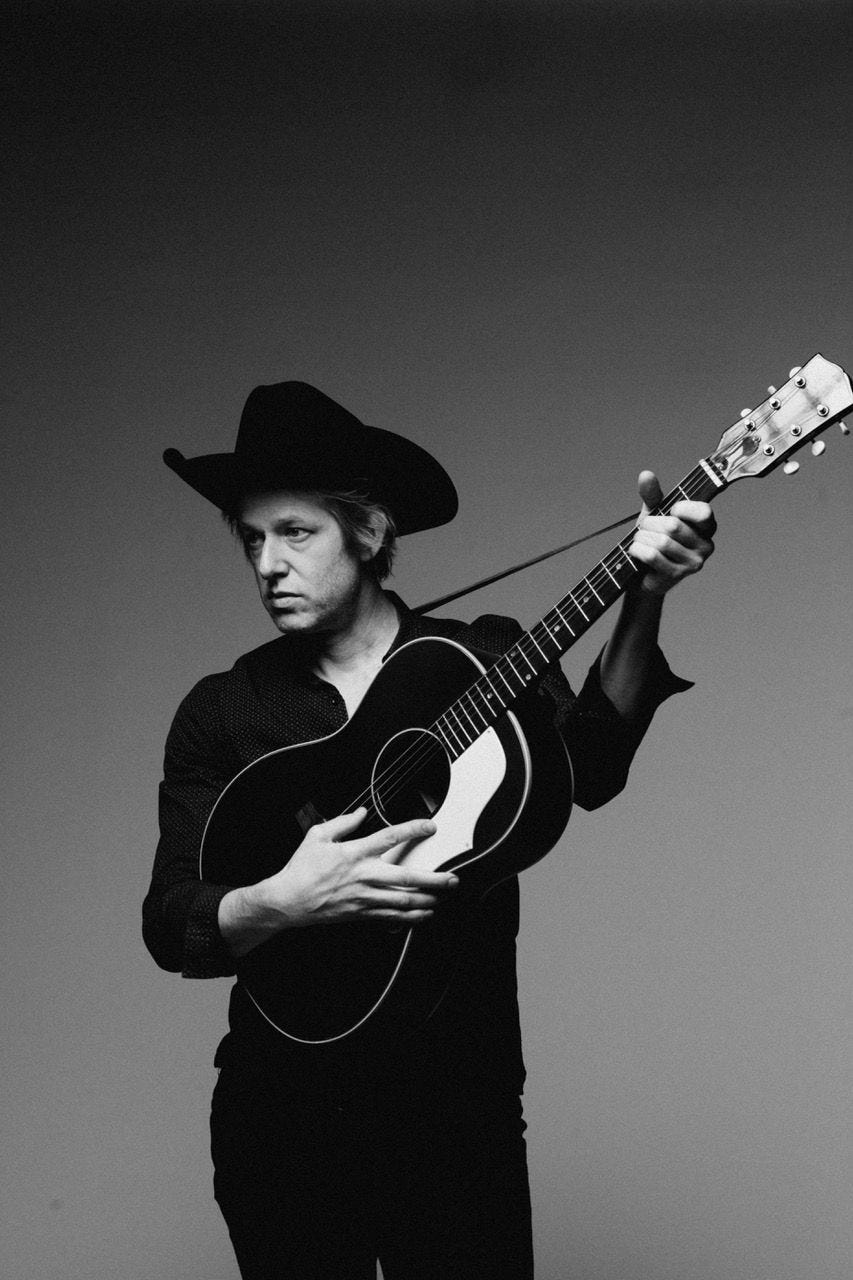Good morning TNC crew!
Wipe your eyes, pull up your pants and please stop crying, the weekend is over but in today’s edition we’ve got a nice breezy chat with Spoon frontman Britt Daniel to get your week going. It’s a free edition too, cheapskates rejoice!
Before we get to that, though, a reminder that in a few weeks we’ve got our first ever TNC live event as Miki Berenyi of Lush and Piroshka will be be joining us for The Story Behind The Songs… Live, an evening of conversation, revelation and music. It’s gonna be a cracker! There’s not many tickets left so head here and grab yours now. We also still have a FREE pair left for a lucky New Cue subscriber, so if that’s you then email us at thenewcue1@gmail.com with the subject of MIKI Tickets.
And after you’ve ordered your tickets and patted yourself on the back for being a ledge, you can get stuck into today’s chat. Well done.
Enjoy the edition,
Ted, Niall and Chris
Start The Week With… Britt Daniel
Spoon are one of the most dependable bands of the modern era. The Texan five-piece emerged in the mid-90s to mild success, but after a wobble that saw them dropped from their major label they have gone on to become one of those rare groups for whom the quality of their output never wavers, each record honing what has gone before and resulting in something that sounds both revitalised and reassuring at the same time. Here’s their 2019 Best Of to get you in the mood:
They released their tenth record Lucifer On The Sofa a few months ago and Niall spoke to frontman Britt Daniel about its creation, the hardest moment in the band and the worst roommate he’s ever had.
Hey Britt, how’s it going?
Alright.
Where are you at the moment?
I’m in London, at Shoreditch. Where are you?
I’m in Southend, about 45 minutes away.
It’s funny, I come to London and I’m doing all these Zooms!
I know, I was just thinking that, annoying. Usually when I’m interviewing someone, it’s on the cusp of them about to release something but your record has already been out for a while. Does your relationship change with an album once it’s out there in the world?
Uh, that’s a good question. I’m not really sure I know. I know that I listen to a record quite a bit right when I finish it and that goes on for maybe a month and then don’t have any need to listen to it anymore. We finished this one a while back and so I didn’t think too much about it. I was thinking about the artwork and I was thinking about doing videos and stuff. And then the press comes and as much as I didn’t really think about whether people would like it or not when I was making it, I was just thinking about whether we liked where it was, then you start thinking, ‘Well, yeah shit, I hope people do like it’ right when the reviews are about to come out. They came out and they were pretty good. If anything, it just reaffirmed for me what I knew all along was that this was a really good one.
How does the finished record compare with what you had in your head at the beginning?
Well, it’s pretty similar, I guess. At the beginning of the process, we just decided we wanted it to be what we, we looked around and we didn’t think there are enough great rock’n’roll records being made right now. and we said ‘we want to make one of those great rock’n’roll records’. We had this guiding principle of it being rock’n’roll and being about a band playing in a room and playing a band playing together. Although there were there were certainly overdubs on this record, it’s much more of an old school record than the last couple that we made.
Of course, the irony is that as you were making it, it became impossible to get people into a room together…
It did become difficult to make it because that was what it was all about, all of us getting together, all of us being there, all of us working on it and then in March of 2020, suddenly, we obviously could not do that. And we couldn’t do it for a while, we kept trying to get together and one thing after another would set us back, whether it was a Covid scare, or someone actually getting Covid, one thing or another for six months. And so it was a challenge to keep making that kind of record. In the interim, we ended up making this one song Lucifer On The Sofa which we made remotely with Dave Fridmann and that’s the one song that doesn’t really follow that blueprint. For a while, we thought we couldn’t put it on the record. We really debated it quite a bit, ‘can this work, because it just doesn’t sound like the rest?’, but in the end we figured out we’d put it on the end, make it be the last song and it’s like that send-off song that sends you off into outer space, a different direction. That made sense to us.
What was your favourite moment making the album?
Maybe the recording of Held, because it happened spontaneously. It’s a song that we used to cover in the 2000s, a Smog song. And I’d say we covered it for about a year, year and a half, but we never recorded it back then and somehow it fell off of the setlist, as sometimes these things do and I don’t know why. We hadn’t played it in years and years and one day, we just said, ‘Hey, let’s whip that out’, just to get us in the mood to play, just for fun, because we do that, we play covers for fun. Pretty soon it became apparent, ‘well, maybe we’re not just doing this for fun, maybe we should record it’. And we did. We recorded it real fast and all these cool little accidents happened that felt spontaneous and incidental but really made the recording work.
How much did doing the Greatest Hits set inform the next phase of the band?
At first, I thought maybe it had because I did listen to all the records and, if anything, I’d say this record sounds a little bit more like one of the ones when we were starting out where we would write all the songs, rehearse them, and then record them instead of, for instance, the last record that we very much made in the studio as we were writing it, recording it as we were writing it, writing it as we were recording it, it was a different type of process. I think this album really was determined by our experience of playing live and how strong we felt we were playing live and how we wanted to make a record that leaned into that rather than a produced-type, piecing-together record.
Which of the two processes which do you prefer?
I think I prefer the old school way. If I had it my way, we’d write all the songs, we’d rehearse them, we’d play them at shows and then we’d come in and record them all in one day and record them on tape and the world doesn’t really seem so up for that right now, especially the way that the music biz works. But that’s the dream.
You went back to Austin to make this record, did you get what you wanted out of the move back there?
Yeah, we got what we wanted and we had three or four months where the idea was to use the energy of the city and that’s why I moved back to Austin, Alex [Fischel, keyboards and guitar] moved to Austin with me. We really delved into it and we had a great time writing and recording the record in that way, bouncing around from club to recording studio to late night writing session. It worked really well. And then of course, they got shut down and then there was a different type of Austin to write about, the one you hear on the song Lucifer On The Sofa.
With that song in mind, who’s the worst roommate you’ve ever had?
My college roommate in my freshman year. I was sharing a room, a dorm room, with this frat guy. When I went off to university, I didn’t know what a fraternity really was, I guess I’d heard the name but I didn’t know what it was all about. And UT [the University of Texas] specifically in Austin, I don’t like to throw this term around, but there was a pretty racist group of clubs, racist and super conservative and just assholes, rich entitled assholes, and I lived with this rich entitled title asshole for about nine months. I’d wake up and he and his pals had me two by my hands, two by my feet and they’re carrying me down the hall in my underwear and throwing me out into the hallway and locking me out. They were just fucking dicks, you know? So there it is, that’s my worst roommate. I ended up sleeping with a pipe for the rest of the semester in my bed in case that happened again.
That sounds pretty rough. What’s been what’s been the hardest moment for you in Spoon?
The first thing that comes to mind is when we got dropped by Elektra and we made we made Girls Can Tell, which I knew was the best thing we’d ever done by far, it was more mature and better songs and better singing, but we couldn’t find anybody to put it out. I thought for a long time, ‘I won’t stop doing music, but I’m not gonna be able to do it in the same way where someone puts out your records’. My family was trying to get me to go to law school and I was substitute teaching and I was feeling very down about the decisions I’d made that led me there. And then somehow it turned around, that record did find a place to come out and from there things took off for the band. It was a really amazing turn of events.
Final question – as you’re currently away from home, what do you miss most about the US when you’re out of the country?
I’ve yet to find a good margarita in London. There must be some good ones, but I haven’t found any yet. If someone is reading knows, write us, let us know!
ND





